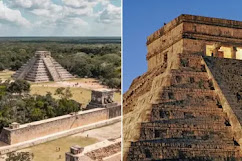How archaeological findings affect our present
Archeology is not just the study of the past. It is the key to understanding the present and the future. By studying ancient artifacts and monuments, we can better understand how human cultures, technologies, and societies developed. This knowledge can help us solve the problems of today and build a better future.
Here are some examples of how archaeological affect our present:
1. Development of new technologies:
The study of ancient methods of processing metals and making ceramics helped to improve modern technologies.
Research into ancient irrigation and water supply systems has inspired the development of new water-saving methods.
2. Preservation of cultural heritage:
Archaeological finds help us better understand our own culture and identity.
The discovery of new ancient monuments contributes to the development of tourism and the economy.
3. Solving modern problems:
Studying ancient epidemics can help us better prepare for new pandemics.
Researching ancient agricultural practices can help us develop new ways to combat climate change.
4. Understanding human nature:
Archaeological findings give us an idea of how people lived in the past, how they ate, dressed, and communicated.
This knowledge can help us better understand ourselves and our place in the world.
Here are some examples of archaeological finds that have had a significant impact on our present:
Rosetta Stone: Discovered in 1799, this trilingual stone helped decipher Egyptian hieroglyphs.
Tomb of Tutankhamun: The discovery of this tomb in 1922 has given us invaluable information about the life and culture of ancient Egypt.
Burials in Osiria: These well-preserved bodies of people who lived 5,300 years ago were found in 1991 in the Alps. Their study has given us new knowledge about life and death in the prehistoric era.
Archeology is a dynamic science that constantly makes new discoveries. These discoveries have a significant impact on our understanding of the past, present and future.




Comments
Post a Comment